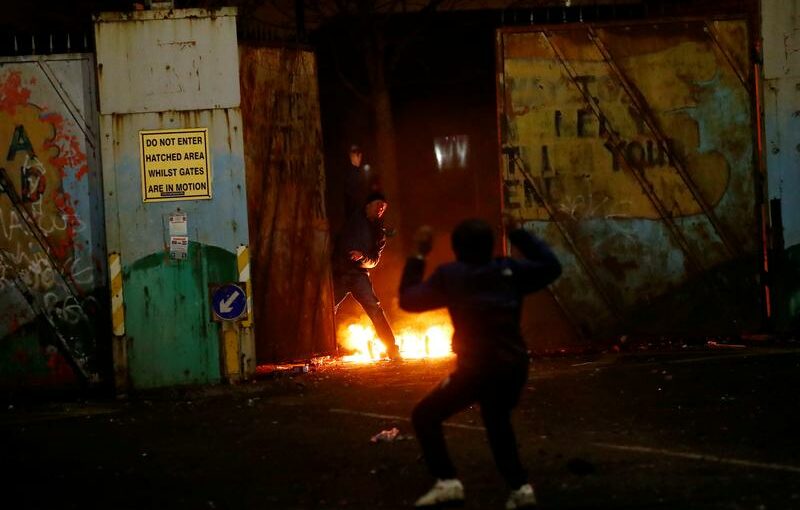BELFAST (Reuters) – Northern Ireland’s power-sharing government put aside factional differences on Thursday to appeal for calm after more than a week of nightly violence partly fuelled by frustration among pro-British unionists over post-Brexit trade barriers.
Hundreds of youths in the British province’s capital Belfast set a hijacked bus on fire and attacked police with stones on Wednesday in scenes reviving memories of decades of sectarian and political strife that claimed some 3,600 lives prior to a 1998 peace deal.
The latest violence has injured 55 police officers and seen boys as young as 13 and 14 arrested on rioting charges.
“We are gravely concerned by the scenes we have all witnessed on our streets,” said the compulsory coalition, led by rival pro-Irish Catholic nationalists and pro-British Protestant unionists.
“While our political positions are very different on many issues, we are all united in our support for law and order and we collectively state our support for policing,” its statement added.
Britain’s minister for Northern Ireland, Brandon Lewis, said he would meet Northern Irish community and political leaders on Thursday. To the south, Ireland’s government had urged the province’s leaders to come together after days blaming each other.
Irish nationalists Sinn Fein and others accused First Minister Arlene Foster’s Democratic Unionist Party of inflaming hostilities with their opposition to the new trade barriers that their supporters feel erase part of their UK identity.
Related Coverage
After London left the European Union’s (EU) orbit at the start of this year, checks and tariffs were introduced on some goods moving from mainland Britain to Northern Ireland as the province was now bordering the bloc via EU member Ireland.
Prime Minister Boris Johnson had promised there would be no hard border between Ireland and Northern Ireland as result of Brexit, and unfettered trade between the province and the rest of the United Kingdom. But critics of the departure deal say a border is now in effect in the Irish Sea, leaving unionists feeling betrayed by London.
‘DESTRUCTION AND DESPAIR’
The DUP has also pointed to a police decision last week not to prosecute Sinn Fein for a large funeral last year that broke COVID-19 regulations. They called for Northern Ireland’s police chief to step down over the matter.
Irish Foreign Minister Simon Coveney said a number of factors were responsible for the anger, and that the post-Brexit trading arrangements were clearly one of them.
Foster said on Thursday that when politics appeared to be failing people, some would offer “destruction and despair”.
“We cannot allow a new generation of our young people to fall victim to that path or be preyed upon by some who prefer the shadows to the light,” she told the regional assembly, which was recalled to discuss the clashes.
Police said on Thursday that in some instances adults had stood clapping while youngsters committed crimes of violence.
Deputy First Minister Michelle O’Neill of Sinn Fein said the spreading of trouble to confrontation between the unionist and Irish nationalist communities was a dangerous escalation and that it was a miracle nobody had died.
Large groups threw fireworks, bricks and petrol bombs at each other late on Wednesday from either side of one of Belfast’s so-called “peace walls” that have divided the two communities in parts of the city since the so-called “Troubles” began.
Parts of the region remain deeply split 23 years after the Good Friday peace deal. Many nationalists aspire to unification with Ireland while unionists want to stay in the United Kingdom.
The European Commission, which is in talks with the British government to try and ease some of the trade barriers, condemned the violence.
“This needs to stop before somebody is killed or seriously injured,” added Ireland’s Coveney on national broadcaster RTE. “These are scenes we haven’t seen in Northern Ireland for a very long time, they are scenes that many people thought were consigned to history.”
Source: Read Full Article
